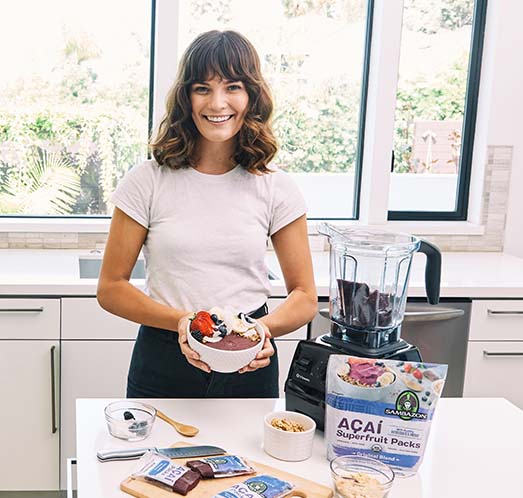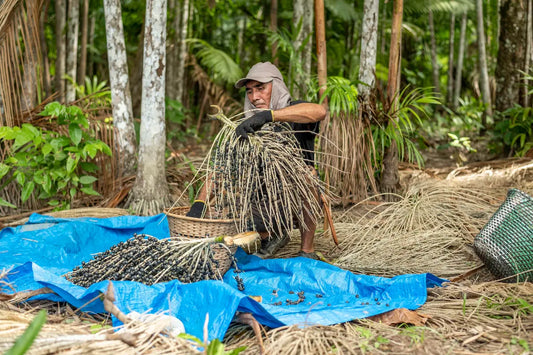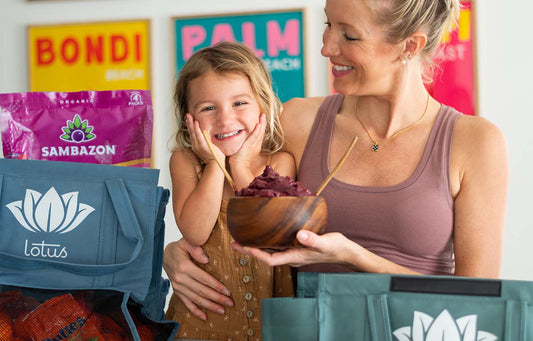We have some exciting updates on our Packaging Eco-mmitment. In our last impact report, SAMBAZON committed to achieving plant-based and post-consumer recycled packaging for all USA retail products by 2025.
While focusing on USA retail products was a great place to start our packaging Eco-mmitment, we are a global company and realize this is not our whole story. To be even more transparent we are updating this Eco-commitment to include our entire global packaging footprint.
It is SAMBAZON’s goal that all retail and foodservice packaging will be from recycled or plant-based materials and be recyclable or compostable by 2030.
Read on to learn where we started, where we are today, where we are going, and how we'll get there as we reduce our environmental impact with our packaging footprint.
WHERE WE STARTED
SAMBAZON is founded on a triple bottom line business philosophy. This means that we consider people, the planet, and prosperity in all of our business decisions. Our Açaí is wild harvested, fair trade certified, and organic. Our packaging also needed to be made with these social and environmental considerations in mind. We started the journey of reducing our packaging footprint to contribute to the rising wave of eco-conscious action to combat plastic waste. Transparency is important to everyone who cares about their impact on the environment. That’s why we decided to create our eco-mmitment to give ourselves an objective to work toward: reducing and eliminating our packaging footprint on the environment.
In 2021, 79% of our USA Retail packaging by weight met our 2025 Packaging Commitment—being made from plant-based or post-consumer recycled packaging. In 2022, this decreased to 73%. It is a complex process to source sustainable packaging, and we faced some challenges this year due to a limited supply of sustainable material, such as recycled PET.
To track our progress on eliminating plastic we have developed our own system of packaging classification.This helps us make clear and responsible decisions when presented with new ideas for packaging based on the sustainability of each category.
In the coming year we will be evaluating nationally recognized frameworks and incorporate those best practices.
WHERE WE ARE AT TODAY
This E-classification system (E=Eco) includes four categories based on different types of packaging material, from E1-E4. E1 is virgin plastic and non-recyclable, and we avoid this whenever we can! E2 is virgin material that is recyclable. Right now, this is often the best available packaging. The final two categories are what we are aiming to fully transition our retail and food service packaging into: E3 is packaging with recycled content that can be recycled. E4 is plant-based material that can be composted or recycled. Here is our current US Retail footprint based on this system we’ve developed
E1: 12%
E2: 15%
E3: 19%
E4: 54%
A New Packaging Innovation: Smoothie Cubes
Our latest and greatest product innovation, Açaí Smoothie Cubes, is not only a great option for enjoying açaí on-the-go, it’s also innovative in its packaging. With this new product, we were looking for ways to reduce excess packaging, specifically plastic. by removing the need for inner liners for this product, and using a paper outer liner on the bag, there is a 43% reduction of plastic per ounce of product compared to similar products. It’s been exciting to see the response to our açaí Smoothie Cubes and we’re excited to continue innovating as we develop new products with delicious taste, functionality, and packaging!
Our International Environmental Impact
This past year we’re specifically excited about bringing our plant-fiber Ready to Eat bowls to the global market. In our international markets, 78% of our products are in the plant-based category (that E4 we mentioned above), and a lot of that is thanks to the 100%plant-fiber based bowl. There has been great excitement around our Ready to Eat bowls from an environmental standpoint, and we’re excited to keep spreading the Delicious Powers of Açaí globally.
Packaging Changes in Previous Years
Since 2019, we transitioned our Sorbet pints from plastic to paper, reducing plastic by about 90%.

We launched the plant-based Ready to Eat-Bowls with a container made from Forest Stewardship Council certified plant-fibers and is recyclable for packaging that’s more planet-friendly. It’s also PFAS free.

We also transitioned our Fresh Juices into 100% post-consumer recycled bottles.

All of our retail products ship in corrugate cases. We are averaging 35% post-consumer recycled and 5% post-industrial recycled content. We are working with our suppliers to increase recycled content while maintaining the integrity of the case. We also work with our suppliers to ensure the material is certified from responsibly managed forests, through the Forest Stewardship Council or the Sustainable Forestry Initiative.
WHERE WE ARE GOING
Our goals are to reduce our packaging footprint where we can. We want to innovate into less packaging and reduce the weight of existing materials or remove material altogether. Then, we aim to use either sustainably managed renewable resources or post-consumer recycled materials at the start of life. We aim for either certified industrial compostable to potentially capture food waste or have a ‘good’ chance of getting recycled at the end of life. ‘Good’ is yet to be determined as we need to not just rely on using the recyclable claims allowed per the Federal Trade Commission. Instead, we want to make sure there is actually an end market for recycling each packaging item that we use.
Our team is actively monitoring new packaging regulations– specifically in California. These regulations impact our decisions, but they also inspire us to constantly improve to stay ahead of those standards. While the global infrastructure gap in packaging is an ever-present challenge, we are lucky to have innovative minds pushing our company forward in the pursuit of reducing our waste and packaging impact.
This is in addition to all of the other key requirements such as food safety, reducing food waste, and protecting the product.
HOW WE'LL GET THERE
When we choose our packaging, we take into consideration contributors such as food safety, food waste, shipping weight, energy usage, waste reduction and production efficiency. Like many companies around the world, at SAMBAZON, we realize we can continue reducing our contribution to plastic pollution. That’s why we have dedicated a team and invested resources to test new, compostable materials and technologies.
We’ve also been spearheading change within our industry: in 2018, we joined the One Step Closer (OSC) Packaging Collaborative with the goal to remove petroleum-based plastics from landfills, oceans, and our planet.
One of the Packaging Collaborative’s key initiatives is to help brands transition into compostable Flexible Films. Through this collaborative network, we are pioneering, testing, and trialing viable plant-based alternatives for the hard-to replace frozen flexible films. This is a complex problem that, once we solve it, will enable us to eliminate most plastic from our frozen items.
Our Eco-mmitment is focused on the start of life, which is where the material comes from and how it is produced. To address the end of life, through OSC, we engage with collaborative groups and organizations working on testing and scaling solutions as well as staying updated with policy changes.
We, and our partners at the One Step Closer Packaging Collaborative, believe that the best way to address this significant challenge is to create an open, collaborative environment. Nearly every company is trying to accomplish a similar goal, and by working together on this initiative, we have the chance to drive an industry shift toward a planet-friendly approach.

WORKING TOGETHER TOWARDS A SOLUTION
We are proud to be a part of One Step Closer, and spearhead change that addresses the toughest sustainability problems facing our industry and our planet. Our intention is to be transparent about the efforts we are making and the progress that accompanies those efforts. If you’d like to get more involved, check out information on how to join the campaign here.








Martha Murray
Very interesting article! I’m 100% to keep our planet clean and be recycling everything.